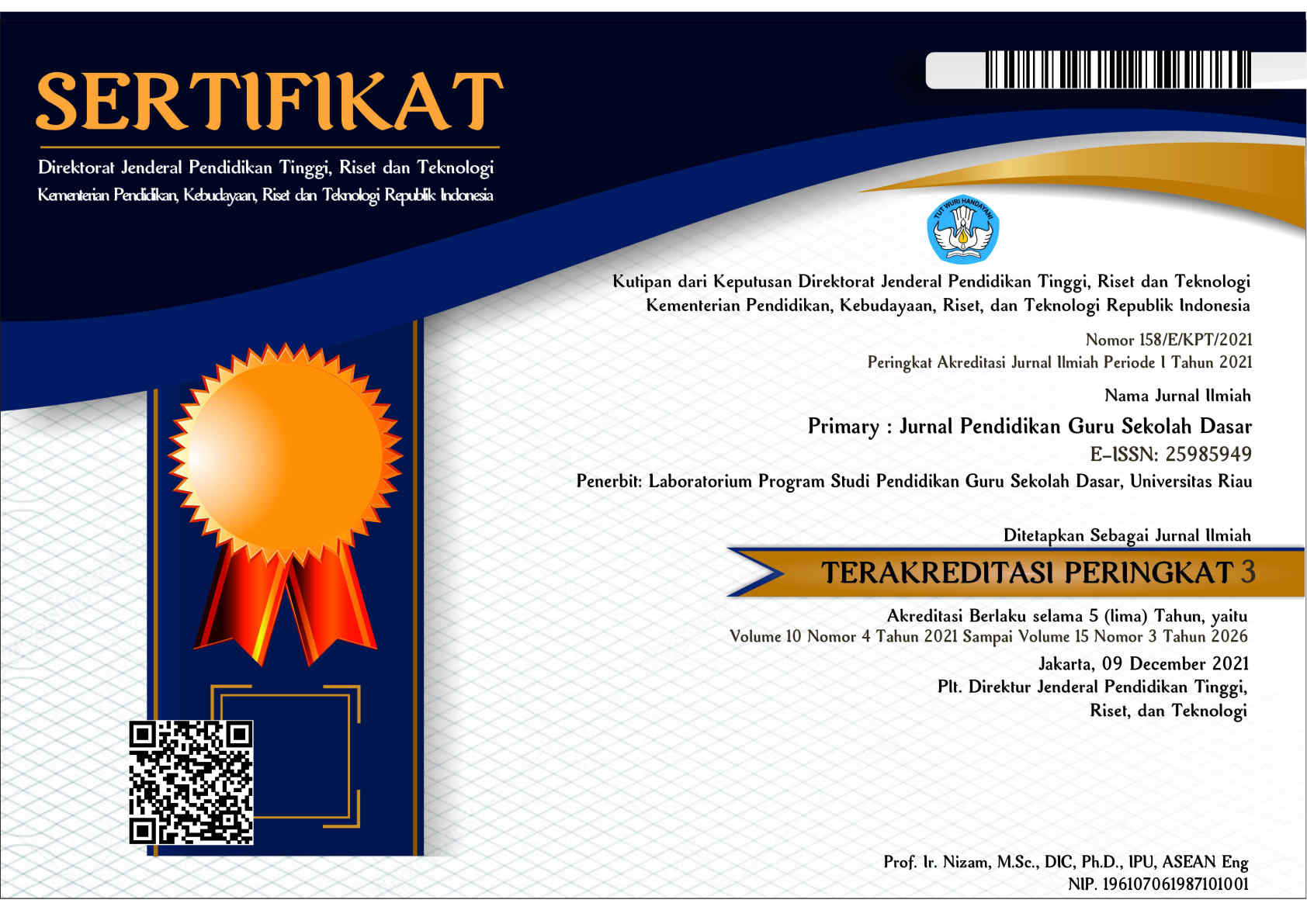IMPLEMENTATION OF THINK-PAIR-SHARE MODEL TO INCREASE THE SIXTH-GRADE STUDENTS’ LEARNING ACTIVITIES AND OUTCOMES AT SD NEGERI 4 PANARUNG
Abstract
The lack of students’ learning activities and outcomes in class VI-B at SDN 4 Panarung is based on the teacher-dominated learning and lecture method. To overcome the problem, the classroom action research through the Think-Pair-Share model was applied to the students. This paper reports the improvement of the student’s learning activities and outcomes on the theme of "Menjelajah Angkasa Luar” (Exploring Outer Space) and the subtheme of "Keteraturan Yang Menakjubkan” (Amazing Order) by applying a cooperative learning model, TPS. There are three classroom action research cycles applied to 16 sixth-grade students in which each cycle contains planning, action, observation, and reflection. The data analysis technique of the research used was descriptive, which compares the test value of each cycle with the success indicators. The research results indicate that (1) the average score of student activity in cycle I was 69, in cycle II it was 76.53, and in cycle III it was 90.53 and (2) the average score of student learning outcomes in cycle I was 65.63, in cycle II it was 74.67, and cycle III it was 82.14. It can be inferred that the implementation of the Think-Pair-Share model can improve student learning activities and outcomes in the theme of "Menjelajah Angkasa Luar” (Exploring Outer Space) and the subtheme of "Keteraturan Yang Menakjubkan” (Amazing Order).
Keywords
Full Text:
PDFReferences
Akyürek, M.İ. (2022). Examining the relationship between school climate and happiness according to primary school students’ perceptions, Education International Journal of Primary, Elementary and Early Years Education, 3-13. https://doi.org/10.1080/03004279.2022.2089711
Arends, R. I. (2008). Learning to Teach : Belajar untuk Mengajar Edisi Ketujuh Buku Dua. Yogyakarta: Pustaka Pelajar.
Arın, E., Kızılaslan Tunçer, B., & Demir, M. K. (2017). Primary school teachers’ views on constructive classroom management. International Electronic Journal of Elementary Education, 8(3), 363–378. Retrieved from https://www.iejee.com/index.php/IEJEE/article/view/119
Benckert, S., & Pettersson, S. (2008). Learning Physics in Small-Group Discussions – Three Examples. Eurasia Journal of Mathematics, Science and Technology Education, 4(2), 121-134. https://doi.org/10.12973/ejmste/75312
Cetin-Dindar, A. (2016). Student Motivation in Constructivist Learning Environment. Eurasia Journal of Mathematics, Science & Technology Education, 12(2), 233-247. https://doi.org/10.12973/eurasia.2016.1399a
Cohen, E. G. (1994). Restructuring the classroom: Conditions for productive small groups. Review of Educational Research, 64, 1–35. https://doi.org/10.3102/00346543064001001
Coşkun, K. & Kara, C. (2020). What Happens During Teacher–Student Interaction in the First Year of Primary School? A New Explanation. SAGE Open, https://doi.org/10.1177/2158244020926566
Dania, R., & Sukma, E. (2020). Peningkatan Proses Pembelajaran Tematik Terpadu Menggunakan Model Cooperative Learning Tipe Think Pair Share di Sekolah Dasar. Jurnal Pendidikan Tambusai, 4(3), 2624–2636. https://doi.org/10.31004/jptam.v4i3.750
Daniel Winantara, I. W., & Laba Jayanta, I. N. (2017). Penerapan Model Pembelajaran TPS Untuk Meningkatkan Hasil Belajar IPA Siswa Kelas V SD No 1 Mengwitani. Jurnal Ilmiah Sekolah Dasar, 1(1), 9–19. https://doi.org/10.23887/jisd.v1i1.10127
Harefa, D, A, L., Simarmata, E, J., Abi, A, R., & Tanjung, D, S. (2022). Upaya Meningkatkan Hasil Belajar Siswa Dengan Menggunakan Model Pembelajaran Kooperatif Tipe Think Pair Share Di Kelas Iv Sd Negeri 091621 Perdagangan . Primary: Jurnal Pendidikan Guru Sekolah Dasar,11 (5), 1605-1617. DOI : http://dx.doi.org/10.33578/jpfkip.v11i5.9175
Hartanto, T.J., Dinata, P.A.C., Azizah, N., Qadariah, A., & Pratama, A. (2023). Students' science process skills and understanding on Ohm's law and direct current circuit through virtual laboratory based predict-observe-explain model. Jurnal Pendidikan Sains Indonesia (Indonesian Journal of Science Education), 11(1):113-128. DOI: https://doi.org/10.24815/jpsi.v10i4.27477
Jurkowski, S., & Hanze, M. (2015). How to increase the benefits of cooperation: Effects of training in transactive communication on cooperative learning. British Journal of Educational Psychology, 85, 357–371. https://doi.org/10.1111/bjep.12077
Majid, A., & Rochman, C. (2015). Pendekatan Ilmiah dalam Implementasi. Kurikulum 2013. Bandung: Remaja Rosdakarya.
Marcelina, S., Miranda, Y., Sinaga, S., & Hartanto, T.J. (2022). Implementasi model pembelajaran predict-observe-explain berbasis masalah terhadap keterampilan proses sains dan pemahaman konsep pada topik pencemaran lingkungan. Jurnal Pendidikan Sains Indonesia (Indonesian Journal of Science Education), 10(4), 705- 716. 10.24815/jpsi.v10i4.25846
Mundelsee, L., & Jurkowski, S. (2021). Think and pair before share: Effects of collaboration on students' in-class participation. Learning and Individual Differences, 88, 102015. https://doi.org/10.1016/j.lindif.2021.102015
Purwaningsih, W., & Wangid, M. (2021). Improving students’ critical thinking skills using time bar media in mathemathics learning in the third-grade primary school. Jurnal Prima Edukasia, 9(2), 248-260. https://doi.org/10.21831/jpe.v9i2.39429
Sanjaya, W. (2011). Strategi Pembelajaran Berorientasi Standar Pendidikan. Jakarta: Prenada Media.
Sariayu, M.R., & Miaz, Y. 2020. Peningkatan Aktivitas Belajar Siswa Melalui Model Think Pair Share di Sekolah Dasar. Jurnal Basicedu, 4(2), 295-305. https://doi.org/10.31004/basicedu.v4i2.337
Singh, S., & Yaduvanshi, S. (2015). Constructivism in Science Classroom: Why and How. International Journal of Scientific and Research Publications, 5(3),
Sudaryono. (2019). Metodologi penelitian: kuantitatif, kualitatif, dan mix method. Depok: Rajawali Pers.
Suprijono, A. (2012). Cooperative Learning: Teori dan Aplikasi PAIKEM. Yogyakarta: Pustaka Pelajar.
Suryanti, Arifin, I.S.Z, & Baginda, U. (2018). The Application of Inquiry Learning to Train Critical Thinking Skills on Light Material of Primary School Students. Journal of Physics: Conference Series, 1108 012128. doi :10.1088/1742-6596/1108/1/012128
Tembang, Y. (2018). Penerapan Model Pembelajaran Think Pair Share untuk Meningkatkan Aktivitas Belajar IPA Siswa Kelas IV SD. Jurnal Ilmiah Sekolah Dasar, 2(1), 46-51. DOI: https://doi.org/10.23887/jisd.v2i1.13928
Yumaroh, I., Ismaya, E.A., & Widianto E. 2020. The Implementation of The Think Pair Share Models on My Hero Theme to Improve Student Learning Outcomes in IV Grade of Elementary School Assisted Puzzle Mozaic Media. DIDAKTIKA: Jurnal Pendidikan Sekolah Dasar, 3(2), 79–88. DOI:10.23887/jisd.v4i3.27145
Wiriaatmadja, R. (2019). Metode Penelitian Tindakan Kelas untuk Meningkatkan Kinerja Guru dan Dosen. Bandung : PT Remaja Rosdakarya.
DOI: http://dx.doi.org/10.33578/jpfkip.v12i2.9622
Refbacks
- There are currently no refbacks.
Copyright (c) 2023 Theo Jhoni Hartanto, Pri Ariadi Cahya Dinata, Arini Arta Naibaho

This work is licensed under a Creative Commons Attribution-NonCommercial-ShareAlike 4.0 International License.
____________________________________________________________
Primary: Jurnal Pendidikan Guru Sekolah Dasar
Secretariat
Program Studi Pendidikan Guru Sekolah Dasar
Gedung B1, FKIP Universitas Riau
Kampus Bina Widya Km. 12,5 Simpang Baru Panam
Pekanbaru Riau Indonesia 28293
e-mail : primary@ejournal.unri.ac.id



